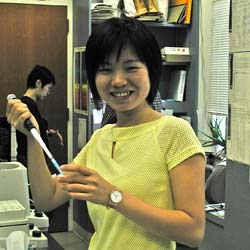

|
|||
|
|||
Phloem
proteomic analysis: Towards a better understanding of the supracellular
regulation of vascular plants
|
|||
| In plants, plasmodesmata (PD) are involved in the trafficking of non-cell-autonomous proteins (NCAPs), which are thought to play important role in plant development. A putative component in this pathway, non-cell-autonomous pathway protein 1 (NCAPP1), has been shown to interact functionally with some NCAPs in vivo and physically with many proteins from phloem sap in vitro (Lee et al., 2003). Ectopic expression of a dominant negative form of NCAPP1 in tobacco caused severe developmental changes. These results suggest that long-distance trafficking of NCAPs (and probably RNA) is likely involved in the regulation of plant development. However, the explicit nature of the NCAPs (and RNA) involved in this supracellular regulation of plant development remains to be analyzed. To further investigate this process of long-distance signaling, we are using our recent finding that NCAPP1 from tobacco interacts with a significant number of pumpkin phloem proteins (see Figure 1). Currently, we are cloning members of NCAPP1 family from squash and the homolog to NtNCAPP1 will be engineered to act as a dominant negative mutant when expressed in melon. Initial experiments will be performed using a transient expression assay based on Zucchini yellow mosaic virus (ZYMV) (see project description under Fan and Brandom). Parallel experiments will involve the production of transgenic squash expressing various forms of the cloned squash NCAPP1-like genes. Our earlier findings indicated that expression of a dominant negative form of NtNCAPP1 resulted in selective inhibition in cell-to-cell trafficking of various NCAPs. Expression of squash NCAPP1, specifically in companion cells, will be used to investigate the extent to which equivalent mutants can perturb protein trafficking across the PD that interconnect the companion cells with the functional sieve tube system. For these experiments, 2-D analysis of squash phloem sap proteins collected from control and transgenic/ZYMV plants will be used to identify candidate NCAPs whose trafficking is blocked, or reduced, in the presence of mutant forms of NCAPP1. | |||
Reference Lee, JY, Yoo, BC, Rojas, MR, Gomez-Ospina, N, Staehelin, LA and Lucas WJ (2003) Selective trafficking of non-cell-autonomous proteins mediated by NtNCAPP1. Science 299: 392-396 |
|||
Ya-Ling Lin is a visiting
student from the Taiwan International
Graduate Student Program, Academia
Sinica, Taiwan |
|||
|
|||
|
|||
